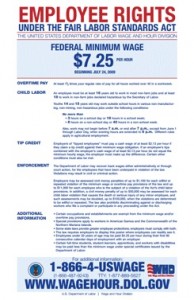
 Our firm represents businesses on overtime compensation claims. Many businesses don’t understand why the former employees would be entitled to overtime compensation as most, if not all, of the former employees were paid a salary. The businesses are frustrated by the fact that these employees entered into contracts, stated that they wanted to be paid a salary in lieu of an hourly wage, and then can turn around and sue for overtime. On some occasions, it was even the former employee’s suggestion to be put on a salary instead of paid on an hourly basis.
Our firm represents businesses on overtime compensation claims. Many businesses don’t understand why the former employees would be entitled to overtime compensation as most, if not all, of the former employees were paid a salary. The businesses are frustrated by the fact that these employees entered into contracts, stated that they wanted to be paid a salary in lieu of an hourly wage, and then can turn around and sue for overtime. On some occasions, it was even the former employee’s suggestion to be put on a salary instead of paid on an hourly basis.
The fact of the matter is that the Fair Labor Standards Act, which governs employee compensation for any business involved in Interstate Commerce, requires that most employees in the United States be paid at least the federal minimum wage for all hours worked and overtime pay at time and one-half the regular rate of pay for all hours worked over 40 hours in a workweek. Failing to pay your employee overtime for any hours worked over 40 hours in a workweek can be very costly. Not only could you be liable to pay the employee time and one-half the regular rate of pay for all hours worked over 40 hours in a workweek, but the Court may also assess a liquidated damages fee equal to the entire amount of overtime you failed to pay the employee. In addition, if the employee hired an attorney to pursue the overtime pay, you may be required to pay the attorney’s fees as well. Even if you the employee worked only one hour of overtime, the Court may still hold you liable for all of the overtime pay, liquidated damages and the employee’s attorney’s fees. One little oversight in determining whether employee benefits include overtime compensation may cost you tens of thousands of dollars.
There are, however, many jobs that are exempt from the overtime requirement. While the Fair Labor Standards Act provides for various exemptions from overtime compensation, some of these exemptions are often not clearly defined. Some of these jobs may include certain managerial jobs, executive jobs, and some administrative and professional jobs. However, these jobs may still not be exempt from the overtime pay requirement if the employee’s pay does not meet certain weekly, semimonthly and monthly salary requirements. Furthermore, the Fair Labor Standards Act does not look merely at the employee’s title to determine whether the employee is exempt rather the actual job functions performed by the employee.
Some other exemptions may include employees whose compensation is mostly commission based, employees paid on a piecemeal basis for production, or if the employee is considered a “highly compensated employee†(i.e. annual compensation exceeding $100,000.00). However, because of the intricacies of the exemption provisions, you should consult an attorney to determine whether your employee is in fact exempt from overtime compensation.
If you have salaried employees and are interested in determining whether or not the employees are exempt from overtime compensation, please contact our office for a consultation.
